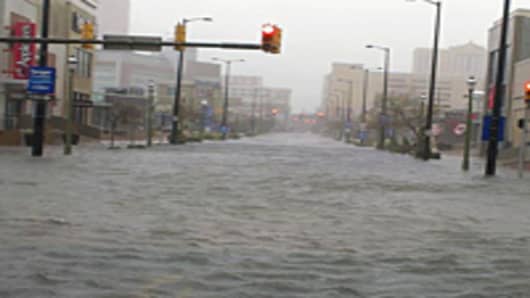Crude oil slumped and gasoline and heating oil futures were barely higher in afternoon trading, as Hurricane Sandy paralyzed travel on the East Coast.
It also appeared most of the region's refineries would continue to operate during the course of Hurricane Sandy. The Colonial Pipeline, which brings gasoline to the East Coast, shut down one line Monday and was monitoring the impact on two others.
"There will be some impact on refineries, but the big impact is on demand. You have a major metro area shut down between Washington and Boston," said Andrew Lipow, president of Lipow Oil Associates. (Read More: Superstorm—'Days Ahead Are Going to Be Very Difficult')
"We're going to lose far more demand than refining supply. We'll have a better idea on Wednesday, but right now the Philadelphia area refineries are certainly attempting to run through the storm," he said.
West Texas Intermediate fell below $85 per barrel, a three-month low. RBOB gasoline futures, jumping as much as 3 percent in early trading, was up less than a penny at $2.64 per gallon. Heating oil rose 0.6 percent to $3.096 per gallon. Natural gas prices were up 3 percent, as traders anticipate more demand from utilities as they take nuclear plants off line during the storm.
According to AAA, the national average price of gasoline fell to $3.543 per gallon at the pump Monday, lower than Sunday's $3.548 and last week's $3.66 per gallon. Even in New Jersey, where drivers lined up to top off tanks this weekend, the average price of regular gasoline was lower at $3.54 Monday than Sunday's $3.55 per gallon, according to AAA. Connecticut prices were also lower, it said.
"My hunch is we'll get a wobble higher here in the next couple of days, and then resume lower," said Tom Kloza, oil analyst with OPIS. Kloza said the spreads between wholesale and retail prices are still wide, and unless the refineries are seriously damaged, the trend for prices at the pump would be lower.
There are just five key refineries that produce gasoline on the East Coast, and they are all located in the track of Hurricane Sandy, in Delaware, Pennsylvania and New Jersey. The Philips 66 refinery in Linden, N.J., is capable of refining 251,000 barrels a day, and it has said it would shut down. (Read More: Scenes from Hurricane Sandy)
Lipow said refineries in Delaware City and Paulsboro, N.J., were operating at minimum rates, and Philadelphia's Sunoco refinery had no plan to shut down. The Delta Monroe Fuels facility in Trainer, Pa., was also continuing to operate. The refineries are capable of refining 1.2 million barrels a day, or about 6.5 percent of U.S. refining capacity. Hess also shut its Port Reading, N.J., refinery but that facility does not produce gasoline.
Analysts said if the refineries did not flood, it would be easy to get them back up and running at higher rates quickly. Tankers carrying crude were barred from entering the Port of New York or Philadelphia due to the storm, and that could temporarily affect production.
"The way the storm is playing out, the refineries should be able to withstand winds. The offset here is in terms of the demand destruction. The East Coast is basically shut down, and there's nobody on the road, and there won't be at least until tomorrow," said John Kilduff of Again Capital. He said heating fuel demand was also not high. "Most of those tanks were topped off ahead of the storm. The jet fuel demand is down, and truckers will be knocked off the road."
About 7,000 flights have been canceled.
East Coast Refinery Production Capacity by Barrels
Delaware
PBF Delaware City 190,000
New Jersey
Phillips66 Linden 251,000
PBF Paulsboro 166,000
Pennsylvania
Monroe Fuels (Delta) Trainer 185,000
Sunoco Philadelphia 355,000
Source: Lipow Oil Associates
Follow Patti Domm on Twitter: @pattidomm
Questions? Comments? Email us at marketinsider@cnbc.com



